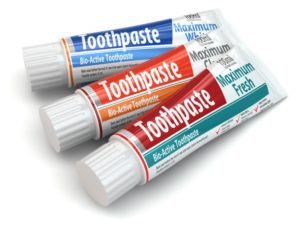 When it comes to your oral health, you want to make sure that your efforts are maximized. Thus, you find it necessary to examine the different aspects of your oral care to ensure that you get the best results. Your local dentist is an advocate for your dental wellness, which is why he’s weighing in with information on one of the most commonly used agents for cleaning your teeth and preventing cavities – toothpaste. As you continue reading, he’ll explain the different types and their purposes, so that you can make educated decisions about which to use.
When it comes to your oral health, you want to make sure that your efforts are maximized. Thus, you find it necessary to examine the different aspects of your oral care to ensure that you get the best results. Your local dentist is an advocate for your dental wellness, which is why he’s weighing in with information on one of the most commonly used agents for cleaning your teeth and preventing cavities – toothpaste. As you continue reading, he’ll explain the different types and their purposes, so that you can make educated decisions about which to use.
Let’s Look at the Different Types
There are a host of different toothpastes, each type designed to address specific needs. Let’s take a look at the options available:
- Fluoridated – The most common type of toothpaste, it actively works to strengthen your enamel and fight against acid damage from plaque buildup.
- Children’s – This type of toothpaste contains far less fluoride because children are more likely to swallow it, which can be harmful in too large a quantity. It’s a great way, though, to introduce the habit of brushing to your little ones.
- Smokers’ – For those struggling with tobacco usage, there’s a special toothpaste designed to combat staining. It contains stronger abrasives than regular toothpaste that target the dark spots left from smoking.
- Herbal/Natural – For those who prefer not to use fluoridated products, there are herbal/natural options available. Still, some of them will contain a very small amount of fluoride to aid in fighting tooth decay.
- Whitening – Whitening toothpaste is somewhat similar to the smokers’ version, in that it contains more abrasives that are geared toward dislodging stains from your teeth. The downside to both is that they could increase sensitivity.
- Sensitive – If you’re suffering from sensitive teeth, this type of toothpaste will be better for you. It contains properties that block tiny holes in your enamel that lead to nerves and produce sharp sensations.
- Tartar Control – When plaque is allowed to sit on your teeth, it can form hard, calculus tartar. Thus, this type of toothpaste attempts to target plaque before it has the chance to completely harden.
- Denture Cleansers – If you where dentures, you can use regular toothpaste to clean them. But effervescent tablets may be the better option, where you allow them to dissolve in water and then soak the dentures in the solution. This route is better at delivering a comprehensive cleaning.
Consistency Matters!
Once you choose the toothpaste that’s best for your dental needs, there is a common denominator that applies. Your efforts must be consistent. The American Dental Association recommends that you brush your teeth at least twice a day for two minutes to properly clean them.
In addition to brushing your teeth, you should also maintain regular visits to your dentist for checkups and cleanings to ensure that no issues are on the horizon and fortify your health.
To get the ball rolling, reach out to your dentist to schedule a visit today!
About the Author
A graduate of Tufts University School of Dental Medicine, Dr. J. Peter St. Clair has been practicing dentistry for over 20 years. Still, he’s remained driven to expand his knowledge by pursuing continuing education, which helps him provide the absolute best care for his patients. Dr. St. Clair practices at Dental Partners of Newburyport and can be reached for more information through his website.
 (978) 465-5358
194 High
St
(978) 465-5358
194 High
St